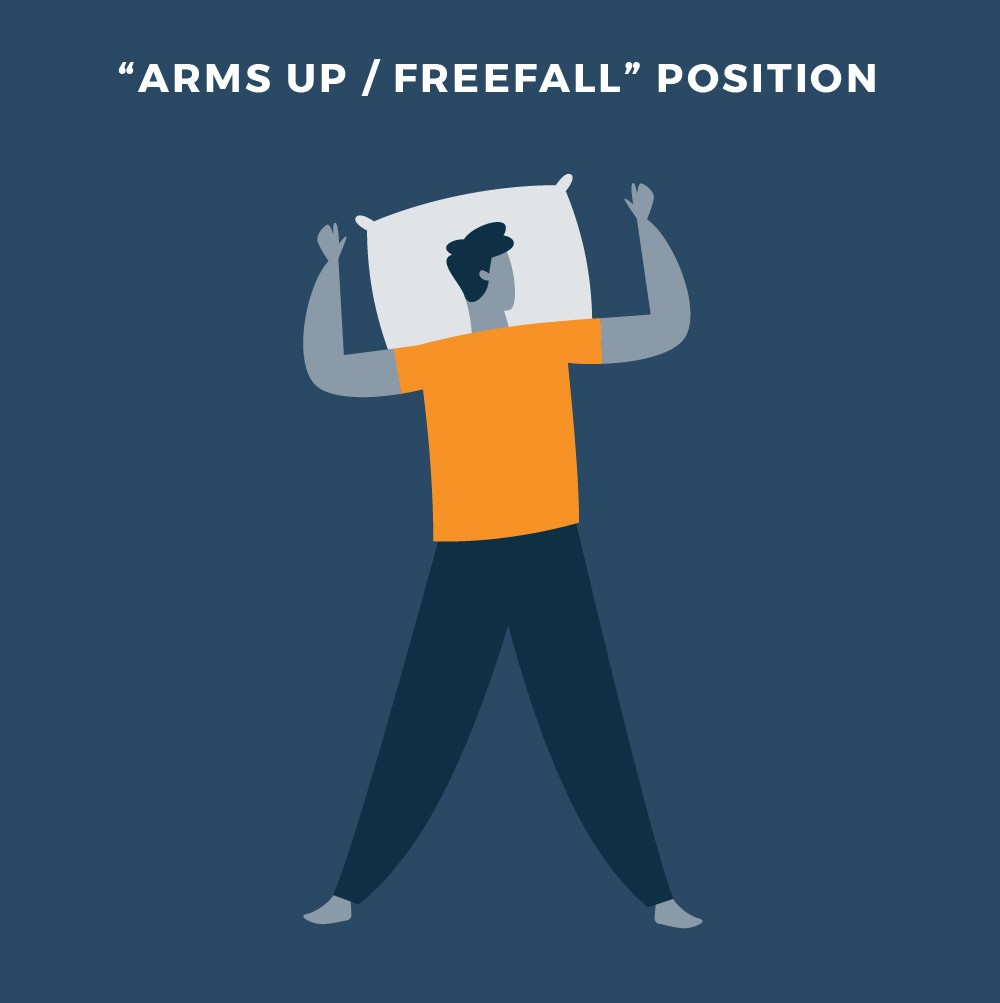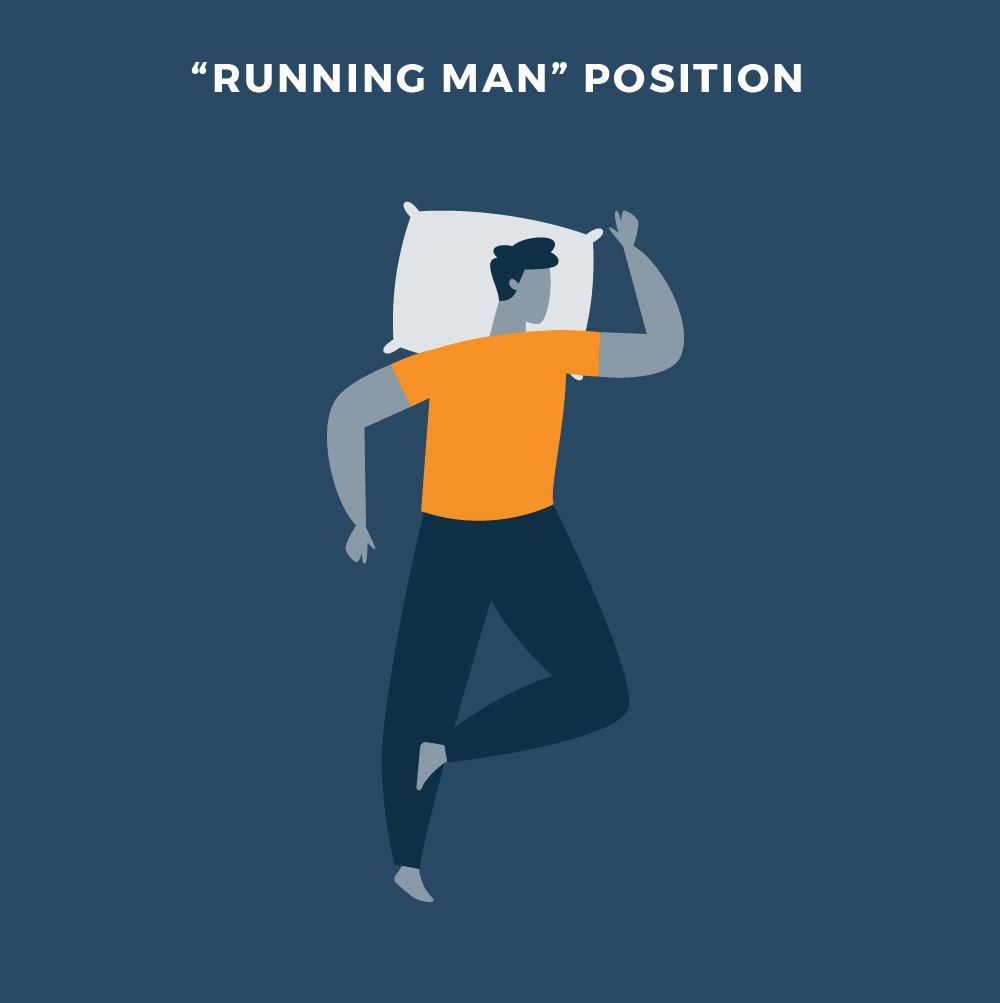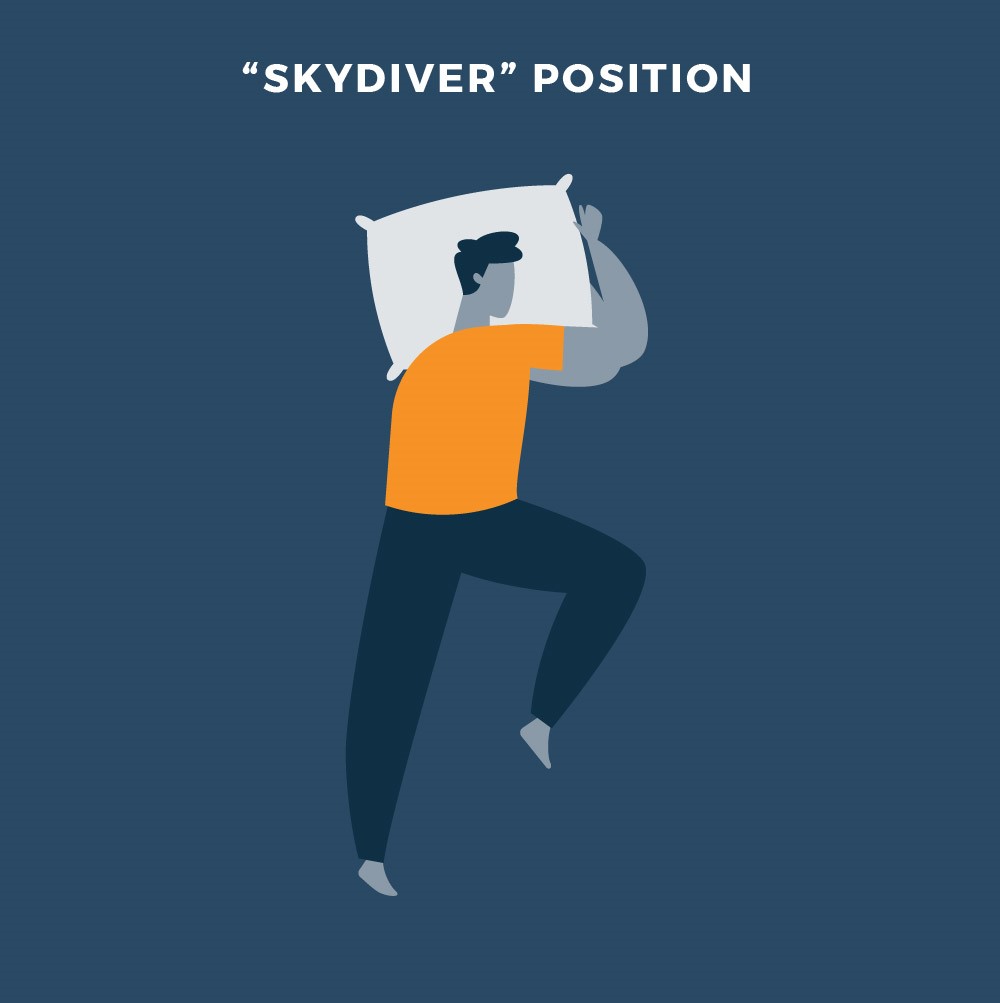Stomach sleeping has both benefits and drawbacks, so it’s a matter of weighing the two before deciding to sleep like this.
If you’re a dedicated stomach sleeper looking to improve your sleep or this position is entirely new, you’ve come to the right place. We’ll discuss everything about stomach sleeping, from advantages and disadvantages to ways to help you sleep on your belly more comfortably.
Tips for How to Sleep on Your Stomach
Use a Flat Pillow
Stomach sleepers need a flat pillow. Sleeping on a thick pillow would force your head to lie at an awkward angle, which could make it difficult to fall asleep. Plus, even if you do fall asleep, you could wake up with neck pain. For this reason, the best pillows for stomach sleeping are the slimmer ones that keep your head closer to the mattress.
Put a Pillow Under Your Hips
Placing a pillow under your hips can help keep your back in a more neutral position by lifting the lower back. The added support reduces pressure on your spine, so you’re less likely to wake up with lower back pain.
Keep Your Legs Flat
Although some people prefer lifting one leg above the other or wrapping a leg around a pillow, this could put more strain on your spine. So, instead of sleeping in a more distorted posture, try to keep your legs as flat as possible to prevent the spine from twisting.
Stretch
Stretching for at least 10 to 20 minutes in the morning or before bed may help with muscle strain5 from sleeping on your belly. Try exercises that push your hips back, such as Child’s Pose in yoga, and remember to stretch out your neck as well.
Invest in the Right Mattress
Investing in the right mattress is key for healthy stomach sleeping. A great mattress for stomach sleeping is firm enough to support your body and prevent your stomach and hips from dipping.
Different Stomach Sleeping Positions
Arms Up / Freefall
The arms-up position includes sleeping with your head to the side and hands wrapped around your pillow. This is one of the safest ways to sleep on your belly, but only if you’re using either a thin pillow or no pillow so your neck isn’t as curved.

The Runner
This position involves sleeping with one arm at your side and the other up to your head while your leg is in a runner position. Many people find this a comfortable posture, but unfortunately, it can strain your back and neck. The best way to improve it is to place a pillow under your forehead and keep your head face-down.

The Skydiver
The skydiver position involves sleeping with one leg up and your arms by your head. To improve it, you should place a pillow under your pelvis and try to keep your leg down. This isn’t the best posture for your spine, but keeping your leg down will help it stay in a more neutral position.

Benefits and Disadvantages of Stomach Sleeping
Stomach Sleeping Benefits
- May help improve airflow – The benefit of stomach sleeping is that it could help improve breathing1. While on your belly, the lungs expand more, allowing you to take in more air.
- Could help manage sleep apnea – Similar to its potential effect on snoring, sleeping on your stomach may also help manage mild sleep apnea2.

Stomach Sleeping Disadvantages
- Can be bad for the back – Stomach sleeping may not be ideal3 for your back. This position makes it harder to maintain good spine alignment because your midsection is more apt to sink into your bed.
- May cause neck pain – Stomach sleeping may also lead to neck pain because your head must be turned to the side. Plus, if you have a pillow with a higher loft, this could further strain the neck.
- Discomfort during pregnancy – Stomach sleeping can be uncomfortable during pregnancy, especially as your belly grows.
- May cause wrinkles or acne breakouts – Stomach sleeping may cause premature wrinkles4 or more breakouts since your face is lying directly against your pillow.
How Do I Prevent Neck Pain When Stomach Sleeping?
The best way to prevent neck pain while sleeping on your stomach is to have the right pillow. Your pillow should be as thin as possible to ensure your neck is aligned with the rest of the body. You should also make sure it’s not too stiff, according to Harvard Health6.
If you’re using a pillow and still feeling neck strain, try sleeping without one and see if this puts less pressure on your neck.
Is It Safe to Sleep On Your Stomach While Pregnant?
Sleeping on your stomach during pregnancy is safe7, but the best position is on your side. Stomach sleeping can also be uncomfortable, especially as your stomach starts to grow. Speak to your doctor about what sleep position is best for you.
Accessories to Help Stomach Sleeping
Firm Mattress Topper
If your mattress is too soft for stomach sleeping and you wake up with back pain, getting a firm mattress topper might help. A mattress topper can help modify the feel of your mattress, making it firmer or softer depending on the topper you get. For stomach sleeping, we suggest a medium-firm to firm topper to make your mattress more suitable for this position.
Hypoallergenic Sheets
Hypoallergenic sheets can help you sleep better by repelling dust mites, pollen, and pet dander. This can be especially helpful when you sleep on your stomach since your face is against the sheets.
Flat, Soft Pillows
Sleeping on your stomach may strain your neck if your pillow is too high, but using a soft, flat pillow could help avoid that. When a pillow is flat and soft, your neck is not as raised and twisted but more aligned with the rest of your body. View our picks for the best pillows for stomach sleepers here.
Frequently Asked Questions
Is sleeping on your stomach good for your lungs?
Yes, stomach sleeping can be good for your lungs. Sleeping on your stomach can help your lungs by allowing them to work with less stress.1
Is sleeping on your stomach bad for you?
Sleeping on your stomach can strain your neck and back, possibly leading to pain when morning rolls around. This can also be a difficult position for pregnant women because there’s more weight in the belly, which puts added stress on the spine.
Is it okay to sleep on your stomach while pregnant?
Yes, stomach sleeping while pregnant is safe, though the ideal position is on your side.7 That said, stomach sleeping may become uncomfortable, especially as you move further along into your pregnancy.
Learn More: How to Sleep While Being Pregnant

Olivera Jancikin
Content Writer
About Author
Olivera is a content writer for Sleep Advisor and is enthusiastic about sleep. She firmly believes in the benefits of daytime naps on top of getting a full 8-hour sleep at night.
Combination Sleeper
Education & Credentials
- Certified Sleep Science Coach
References:
- Lumb, A.B. Lumb., White, A. “Breathing in the prone position in health and disease”. BJA Education. 2021.
- Bidarian-Moniri, Armin., et al. “The effect of the prone sleeping position on obstructive sleep apnoea”. Acta Oto-Laryngologica. 2015.
- Cary, Doug., Jacques, Angela., Briffa, Kathy. “Examining relationships between sleep posture, waking spinal symptoms and quality of sleep: A cross sectional study”. PLoS One. 2021.
- Anson MD, Goesel., Kane MD, Michael A.C., Lambros MD, Val. “Sleep Wrinkles: Facial Aging and Facial Distortion During Sleep”. Aesthetic Surgery Journal. 2016.
- Behm PhD, David G., et al. “Effects of Stretching on Injury Risk Reduction and Balance”. Journal of Clinical Exercise Physiology. 2021.
- “Say “good night” to neck pain”. Harvard Health. February 2, 2022.
- “Sleeping Positions During Pregnancy”. Stanford Health. Webpage accessed November 28, 2023.
- “Maternal sleep position during pregnancy”. National Institute for Health and Care Excellence (NICE). 2021.
